新人教版九年级英语unit4-知识点总结加练习及作文范文
- 格式:doc
- 大小:47.00 KB
- 文档页数:3
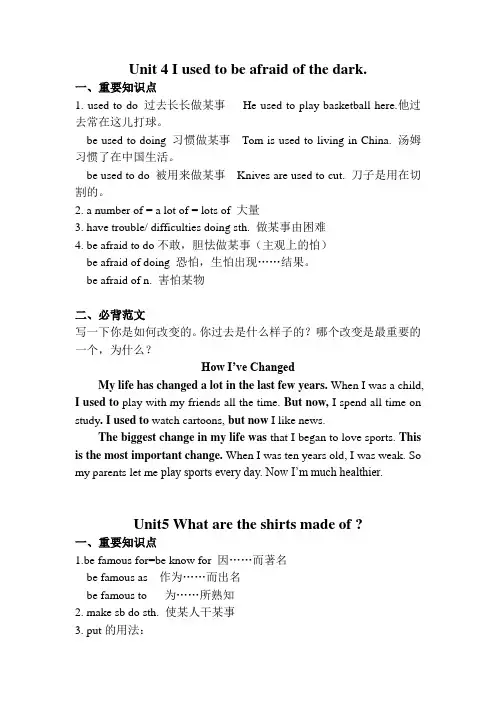
Unit 4 I used to be afraid of the dark.一、重要知识点1. used to do 过去长长做某事He used to play basketball here.他过去常在这儿打球。
be used to doing 习惯做某事Tom is used to living in China. 汤姆习惯了在中国生活。
be used to do 被用来做某事Knives are used to cut. 刀子是用在切割的。
2. a number of = a lot of = lots of 大量3. have trouble/ difficulties doing sth. 做某事由困难4. be afraid to do不敢,胆怯做某事(主观上的怕)be afraid of doing 恐怕,生怕出现……结果。
be afraid of n. 害怕某物二、必背范文写一下你是如何改变的。
你过去是什么样子的?哪个改变是最重要的一个,为什么?How I’ve ChangedMy life has changed a lot in the last few years. When I was a child, I used to play with my friends all the time. But now, I spend all time on study. I used to watch cartoons, but now I like news.The biggest change in my life was that I began to love sports. This is the most important change. When I was ten years old, I was weak. So my parents let me play sports every day. Now I’m much healthier.Unit5 What are the shirts made of ?一、重要知识点1.be famous for=be know for 因……而著名be famous as 作为……而出名be famous to 为……所熟知2. make sb do sth. 使某人干某事3. put的用法:Put on 穿上,put up 建造,put out 熄灭,put off 推迟,put down 放下,put away 收起来4. be allowed to do sth. 被允许做某事5. be covered with…被……覆盖二、重要语法:一般现在时的被动语态当主语为动作的执行者时, 谓语的形式为主动语态; 当主语为动作的承受者时, 谓语要用被动语态。
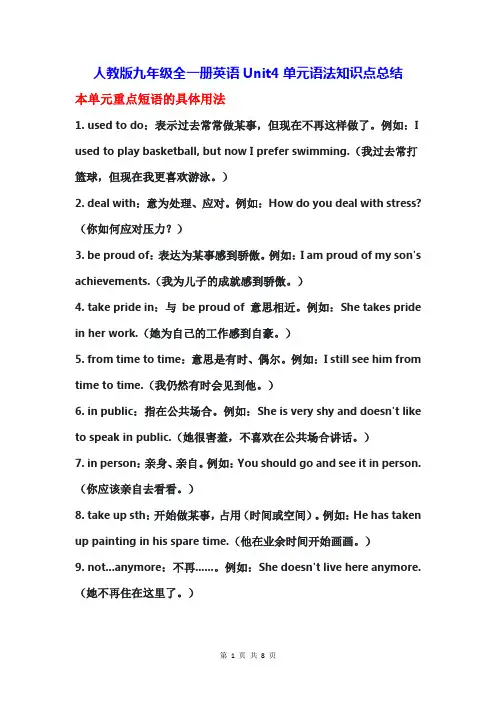
人教版九年级全一册英语Unit4单元语法知识点总结本单元重点短语的具体用法1. used to do:表示过去常常做某事,但现在不再这样做了。
例如:I used to play basketball, but now I prefer swimming.(我过去常打篮球,但现在我更喜欢游泳。
)2. deal with:意为处理、应对。
例如:How do you deal with stress?(你如何应对压力?)3. be proud of:表达为某事感到骄傲。
例如:I am proud of my son's achievements.(我为儿子的成就感到骄傲。
)4. take pride in:与be proud of 意思相近。
例如:She takes pride in her work.(她为自己的工作感到自豪。
)5. from time to time:意思是有时、偶尔。
例如:I still see him from time to time.(我仍然有时会见到他。
)6. in public:指在公共场合。
例如:She is very shy and doesn't like to speak in public.(她很害羞,不喜欢在公共场合讲话。
)7. in person:亲身、亲自。
例如:You should go and see it in person.(你应该亲自去看看。
)8. take up sth:开始做某事,占用(时间或空间)。
例如:He has taken up painting in his spare time.(他在业余时间开始画画。
)9. not...anymore:不再......。
例如:She doesn't live here anymore.(她不再住在这里了。
)10. worry about:担心、担忧。
例如:Don't worry about the exam, just do your best.(不要担心考试,尽力就好。
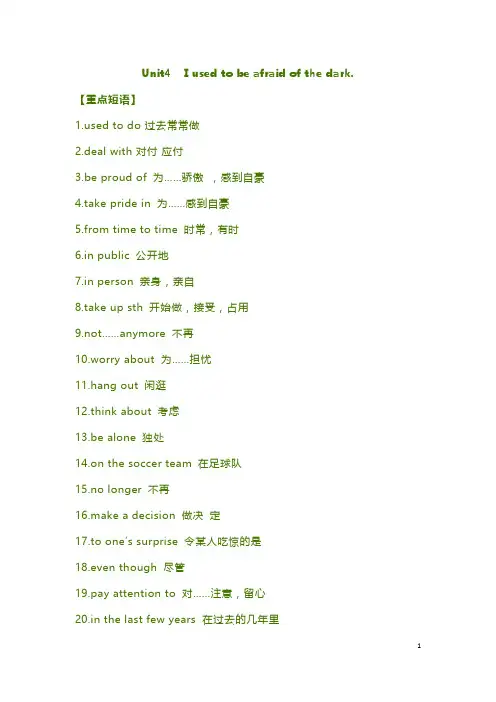
Unit4 I used to be afraid of the dark.【重点短语】ed to do 过去常常做2.deal with 对付应付3.be proud of 为……骄傲,感到自豪4.take pride in 为……感到自豪5.from time to time 时常,有时6.in public 公开地7.in person 亲身,亲自8.take up sth 开始做,接受,占用9.not……anymore 不再10.worry about 为……担忧11.hang out 闲逛12.think about 考虑13.be alone 独处14.on the soccer team 在足球队15.no longer 不再16.make a decision 做决定17.to one’s surprise 令某人吃惊的是18.even though 尽管19.pay attention to 对……注意,留心20.in the last few years 在过去的几年里21.be afraid of 害怕22.turn red 变红23.tons of attention 很多关注24.be careful 当心25.give up 放弃26.a very small number of …极少数的……27.give a speech 作演讲28.all the time 一直总是29.be interested in 对……感兴趣30.change one’s life 改变某人的生活31.take care of 照顾32.one of…, ……之一【重点句型】1. I used to be afraid of the dark.我过去常常前害怕黑暗.2.I go to sleep with my bedroom light on.我开着卧室的灯睡觉.3. I used to spend a lot of time playing games with my friends.以前我常常花很多时间和我的朋友们玩游戏.4. I hardly ever have time for concerts.我几乎没有时间去听音乐会.5. My life has changed a lot in the last few years.我的生活在过去几年里改变了很多.6. It will make you stressed out.那会使你紧张的.7. It seems that Yu Mei has changed a lot.玉梅似乎变化很大.Unit4单元测试卷笔试部分Ⅳ.单项选择16.______ the money that Mr Brown ______,poor Mary could go back to school again.A.In; offered B.With; offeredC.In; was offered D.With; was offered17.Don t worry!I m sure you ll ______your classmates if you are kind and friendly to them.A.catch up with B.agree withC.get on well with D.make friend with18.—What a hard problem!—Ask Mary.Maybe she has ______ with a good idea about it.A.come up B.ended upC.met up D.kept up19.—______ his car is broken?—He has to walk there.A.What if B.What aboutC.Do you know D.Even though20.—Each year, ______ fishes are killed by the polluted water and many people are made sick by the polluted air.—So we should do something to stop it!A.millions of B.million ofC.two millions of D.two millions21.We should have ______ in ourselves and we will make it if we have a try. A.success B.confidenceC.progress D.knowledge22.There are ______ books on the shelf.A.plenty of B.a lotC.a plenty of D.a good many of23.Miss Yang always helps others.She is very ______.A.careful B.gratefulC.useful D.helpful24.The rest of the students ______ not allowed to leave the classroom at that time.A.are B.haveC.was D.were25.I ______ read some good books than watch a bad TV program.A.would rather B.would likeC.had better D.prefer toⅤ.完形填空Everyone needs friends.We all like to feel close to someone.__26__is nice to have a friend to talk, laugh, and do things with.__27__,sometimes we need to be alone.We don t always want people around.But we would feel lonely if we __28__had a friend.No two people are just the same.Friends__29__don t get on well.That doesn t mean that they no longer like __30__.Most of the time they will make up and become__31__again.Sometimes friends move away.Then we feelvery__32__.We miss them very much, but we can call them and write to them.It could be that we would even see them again.And we can __33__new friends.It is surprising to find out how much we like new people when we get to know them.There s more good news for people who have friends.They live longer than people who don t.Why?It could be that they are__34__.Being happy helps you stay well.So remember to bring happiness to your friends in turn.If someone cares about you, you should take__35__care of him or her.26.A.It B.He C.There D.Someone27.A.Hardly B.Nearly C.Suddenly D.Certainly28.A.ever B.never C.just D.really29.A.always B.sometimes C.often D.usually30.A.each other B.others C.the others D.another31.A.friendly B.good C.pleased D.friends32.A.angry B.sad C.happy D.alone33.A.look for B.find C.make D.know34.A.happier B.stronger C.kinder D.richer35.A.less B.better C.little D.noⅥ.阅读理解AIt was a wet and stormy night.The small gentlelooking man who had come into the inn was drenched (湿透) to the skin.He made his way to the fireplace but there were several villagers warming themselves in front of the fire and he could not go near it.As he stood there, the landlord who knew him slightly welcomed him and asked him why he was looking so sad.“I have lost a purse with twenty gold florins (一种叫做弗罗林的货币) in it,” said the man.“Where did you lose it?” asked the landlord as the men who had been standing in front of the fire gathered around them.“Within a mile of this place, I m sure,” said the man.“I ll go in search of it early in the morning.Nobody is likely to travel by that road in this weather and the purse will certainly be there till morning.”“If I were you...” began the landlord.“Yes, yes, what would you have done?” interrupted (打断) the man.“But come, let us warm ourselves by the fire.See, everybody has left!Where do you think all of them could have gone in this bad weather?”“If I were you,” said the landlord, grinning, “I would have become a story writer!”36.One stormy night, a small gentlelooking man ______.A.came into the innB.could go near the fireC.lost his purseD.looked for his purse37.The gentlelooking man could not go near the fire because ______. A.several villagers were in front of the fireB.the landlord stopped himC.he made his way to other placesD.he could not walk38.The villagers______after they heard the conversation between the man and the landlord.A.became story writersB.went home togetherC.gathered around themD.went in search of the purse39.The word “grin” probably means “______”.A.低声地哭 B.气愤地说C.露齿而笑 D.大声地唱40.According to the passage, which of the following is NOT true?A.The landlord knew the small gentlelooking man.B.The landlord became a story writer at last.C.It was wet and stormy that night.D.In fact, the gentlelooking man didn t lose his nurse.BWelcome to Tonglin Hotel.We will offer you the best service, so that you can have a pleasant stay here.Room Service:You can use room service 24 hours a day.Phone the Information Desk, and your message will be passed on to the room waiter.Dining Room:You can have three meals a day in the dining room.Breakfast is offered from 8:00 am to 9:30 am.Also the room waiter may bring breakfast to your room at any time after 7:00 am.If you need breakfast, please fill out a card and hang it outside your door before 6:00 am.Lunch is from 12:00 to 2:00 pm.Dinner is from 6:30 pm to 8:30 pm.Telephones:To make a phone call, you should dial (拨号) “0” for the Information Desk to put you through to the room waiter.There are also public telephones near the Information Desk.Tell the Information Desk if calls are needed.Shop:The hotel shop is open from 9:00 am to 5:30 pm.Coffee House:You can drink coffee here at the following times:12:00 2:00 pm8:00 pm 1:30 amOther Services:There is a cinema in the hotel.Films begin at 7:00 pm on Sundays and Wednesdays.Hot water is offered 24 hours a day.There is also a big swimming pool in the hotel.You can enjoy yourself at any time you like.It is free.41.You would see this notice______.A.in a hotel shopB.in a bedroom of a large hotelC.in a hotel dining roomD.on the door of a small hotel42.What would you do if you want room service at night?A.Fill out a card.B.Phone the room waiter.C.Go to the Information Desk.D.Phone the Information Desk.43.If you want to have your breakfast at a quarter past seven, youshould______.A.phone the Information DeskB.go to the hotel dining roomC.go to the coffee house to have itD.put a message outside your room before 6:00 am44.If you want to have two hours talk in the coffee house, you may gothere at______.A.1:00 pm B.12:30 pmC.10:00 pm D.11:30am45.The notice tells us that we can______.A.see a film whenever we want toB.go to the coffee house once a weekC.go shopping at any time in the hotelD.swim in the pool without paying moneyCZhang Hongying, girl, 15I want to make our lunch time longer.At the moment, lunch time is short.Most of myclassmates would like to do their homework during this time.But if they don t get a go od rest, they won t have enough energy for the afternoon.So I would like to have more time so that we can take a nap after lunch.That way, we ll learn better in the afterno on.Zhao Pengran, girl, 15I would like to have more chances to talk in English.Now, the English classes are not enough for us to practice speaking English.I think we d better have one morning a week at least to have spoken English lessons in order to improve our English.Zhou Jiancheng, boy, 15My idea would be to have more fashionable school uniforms.If I were the headmaster, I would ask the students to design the uniforms themselves.We could have a contest am ong student designers.Then, we could ask others to choose their favorite.This way, we ll be able to wear what we like best.How nice it would be for us young people!以上为某学校通过校长意见箱收集到的一些学生的意见和建议。
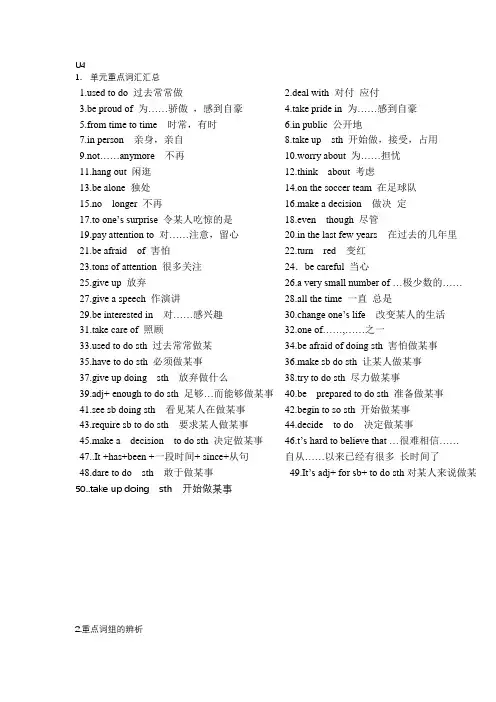
U41.单元重点词汇汇总ed to do 过去常常做2.deal with 对付应付3.be proud of 为……骄傲,感到自豪4.take pride in 为……感到自豪5.from time to time 时常,有时6.in public 公开地7.in person 亲身,亲自8.take up sth 开始做,接受,占用9.not……anymore 不再10.worry about 为……担忧11.hang out 闲逛12.think about 考虑13.be alone 独处14.on the soccer team 在足球队15.no longer 不再16.make a decision 做决定17.to one’s surprise 令某人吃惊的是18.even though 尽管19.pay attention to 对……注意,留心20.in the last few years 在过去的几年里21.be afraid of 害怕22.turn red 变红23.tons of attention 很多关注24.be careful 当心25.give up 放弃26.a very small number of …极少数的……27.give a speech 作演讲28.all the time 一直总是29.be interested in 对……感兴趣30.change one’s life 改变某人的生活31.take care of 照顾32.one of……,……之一ed to do sth 过去常常做某34.be afraid of doing sth 害怕做某事35.have to do sth 必须做某事36.make sb do sth 让某人做某事37.give up doing sth 放弃做什么38.try to do sth 尽力做某事39.adj+ enough to do sth 足够…而能够做某事40.be prepared to do sth 准备做某事41.see sb doing sth 看见某人在做某事42.begin to so sth 开始做某事43.require sb to do sth 要求某人做某事44.decide to do 决定做某事45.make a decision to do sth 决定做某事46.t’s hard to believe that …很难相信……47..It +has+been +一段时间+ since+从句自从……以来已经有很多长时间了48.dare to do sth 敢于做某事49.It’s adj+ for sb+ to do sth对某人来说做某50..take up doing sth 开始做某事2.重点词组的辨析辨析:used to do sth. 过去常常做…get/be used to sth./doing sth. 现在习惯于…be used to do 被用于做…(被动语态)be used by 由(被)…使用(被动语态)be used as … 被当做…使用(被动语态)be used for doing 被用于做…(被动语态)例: I used to go to work by bus. Now I take a taxi.He used to be a problem boy. She used to be very shy.I’m used to drinking a cup of water after meal.He’s been used to living in the dormitory.A hammer is used to drive nails.This machine is used to clean the floor.The girl is being used as a servant in the house.A knife can be used for cutting bread.used to的用法“used to+动词原形”表示过去常常干某事,现在不在干了。
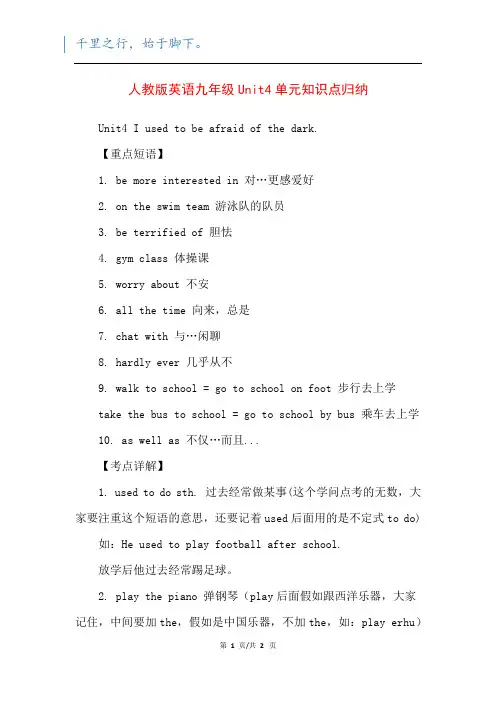
人教版英语九年级Unit4单元知识点归纳
Unit4 I used to be afraid of the dark.
【重点短语】
1. be more interested in 对…更感爱好
2. on the swim team 游泳队的队员
3. be terrified of 胆怯
4. gym class 体操课
5. worry about 不安
6. all the time 向来,总是
7. chat with 与…闲聊
8. hardly ever 几乎从不
9. walk to school = go to school on foot 步行去上学
take the bus to school = go to school by bus 乘车去上学
10. as well as 不仅…而且...
【考点详解】
1. used to do sth. 过去经常做某事(这个学问点考的无数,大家要注重这个短语的意思,还要记着used后面用的是不定式to do) 如:He used to play football after school.
放学后他过去经常踢足球。
2. play the piano 弹钢琴(play后面假如跟西洋乐器,大家
记住,中间要加the,假如是中国乐器,不加the,如:play erhu)。
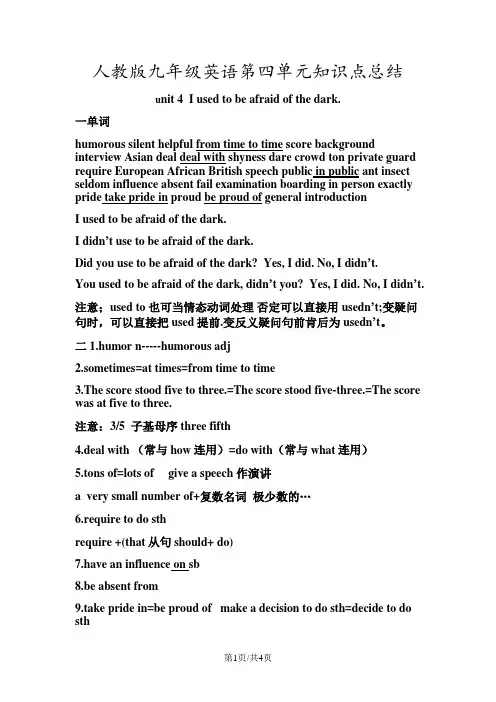
人教版九年级英语第四单元知识点总结u nit 4 I used to be afraid of the dark.一单词humorous silent helpful from time to time score background interview Asian deal deal with shyness dare crowd ton private guard require European African British speech public in public ant insect seldom influence absent fail examination boarding in person exactly pride take pride in proud be proud of general introductionI used to be afraid of the dark.I didn’t use to be afraid of the dark.Did you use to be afraid of the dark? Yes, I did. No, I didn’t.You used to be afraid of the dark, didn’t you? Yes, I did. No, I didn’t.注意;used to 也可当情态动词处理否定可以直接用usedn’t;变疑问句时,可以直接把used提前.变反义疑问句前肯后为usedn’t。
二1.humor n-----humorous adj2.sometimes=at times=from time to time3.The score stood five to three.=The score stood five-three.=The score was at five to three.注意:3/5 子基母序 three fifth4.deal with (常与how连用)=do with(常与what连用)5.tons of=lots of give a speech 作演讲a very small number of+复数名词极少数的…6.require to do sthrequire +(that从句 should+ do)7.have an influence on sb8.be absent from9.take pride in=be proud of make a decision to do sth=decide to do sthgive a general self-introduction fail the exam10.What’s sb like?(问外貌+性格)What does sb look like?(只问外貌)11.be on a swim team. get good grades on one’s exams12.such+a/an +adj+ n=so +adj +a/an+ n so+ adj/adv13.It has been three years since we last saw our primary school classmates.现在完成时标志词;since+时间点 for+ 时间段 in the last few years already yet ever so faruntil now recently these days/weeks/years注意:since后为一般过去时,主句用现在完成时have/has done ed to do sth 过去常常干某事be/get used to doing sth 习惯于干某事 be used to do sth=be used for doing sth 被用来做某事15.see/notice/ watch/look at/hear/listen to+ do(全过程)/ doing(正在做)16.take up1)从事,开始+doing sth He left a job in the city to take up farming.2)占据 The table takes up too much room.3)继续I put the telephone down and took up the work again.17.dare to do sth敢于做某事have to do sth 必须做某事(客观)=must do sth(主观)18.She is not shy anymore.=she is shy no more.not …anymore=no more(not置于be/助动词/情态动词之后)(no more通常置于句末)19.be able to=can能够 to one’s surprise令某人吃惊的是 to one’s +n pay attention to+ doing sth .....对做某事关注adj+ enough to do sth 足够…而能够做某事20.too much+ U/ too many+ C复太多的…..much too +adj 太….21.appear/disappear hang out with sbbe ready to do sth=prepare to do sth give up doing sth the roadto the successbooks on sth(关于….的书) at least/at mostwalk to school=go to school on foot wear the school uniforms all the timebe nervous about sth22.have difficulties/problems (in) doing sth23.cause problems另;使某人干某事 cause/get sb to do sth have/let/make sb do sth注意;变被动do要变成to do24.lonely 主观上孤单alone客观上一个人25.finally=at last=in the endbe afraid of doing sth=be terrified of doing sth=be afraid to do sth=be terrified to do sth26.advise sb to do sth/advise doing/advice that( shoud do)27.in person 亲自 even though=even if=although=though28.They are always thinking of me.be always doing sth常表达说话人的某种情绪。
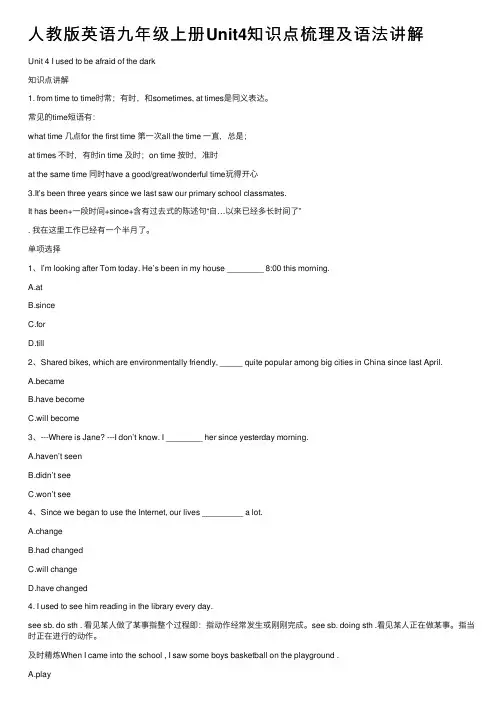
⼈教版英语九年级上册Unit4知识点梳理及语法讲解Unit 4 I used to be afraid of the dark知识点讲解1. from time to time时常;有时,和sometimes, at times是同义表达。
常见的time短语有:what time ⼏点for the first time 第⼀次all the time ⼀直,总是;at times 不时,有时in time 及时;on time 按时,准时at the same time 同时have a good/great/wonderful time玩得开⼼3.It’s been three years since we last saw our primary school classmates.It has been+⼀段时间+since+含有过去式的陈述句“⾃…以来已经多长时间了”. 我在这⾥⼯作已经有⼀个半⽉了。
单项选择1、I’m looking after Tom today. He’s been in my house ________ 8:00 this morning.A.atB.sinceC.forD.till2、Shared bikes, which are environmentally friendly, _____ quite popular among big cities in China since last April.A.becameB.have becomeC.will become3、---Where is Jane? ---I don’t know. I ________ her since yesterday morning.A.haven’t seenB.didn’t seeC.won’t see4、Since we began to use the Internet, our lives _________ a lot.A.changeB.had changedC.will changeD.have changed4. I used to see him reading in the library every day.see sb. do sth . 看见某⼈做了某事指整个过程即:指动作经常发⽣或刚刚完成。
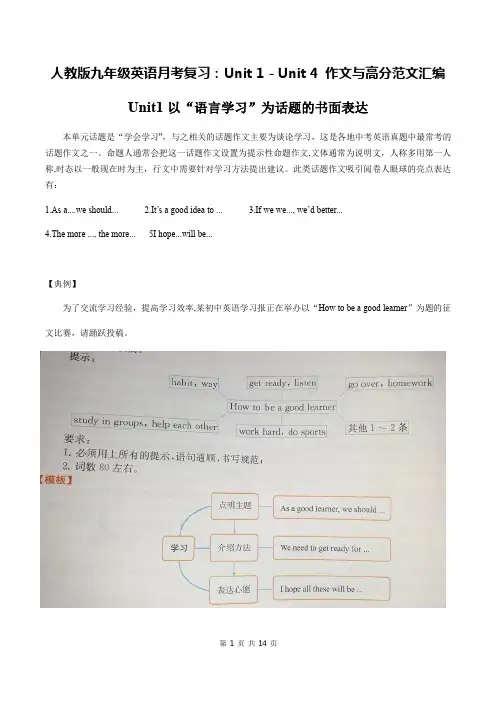
人教版九年级英语月考复习:Unit 1-Unit 4 作文与高分范文汇编Unit1以“语言学习”为话题的书面表达本单元话题是“学会学习",与之相关的话题作文主要为谈论学习,这是各地中考英语真题中最常考的话题作文之一。
命题人通常会把这一话题作文设置为提示性命题作文,文体通常为说明文,人称多用第一人称,时态以一般现在时为主,行文中需要针对学习方法提出建议。
此类话题作文吸引阅卷人眼球的亮点表达有:1.As a....we should...2.It’s a good idea to ...3.If we we..., we’d better...4.The more ..., the more... 5I hope...will be...【典例】为了交流学习经验,提高学习效率,某初中英语学习报正在举办以“How to be a good learner”为题的征文比赛,请踊跃投稿。
进入九年级以后,学习任务越来越艰巨,压力也越来越大。
有好多同学感到心烦意乱。
假如你比较擅长英语,请你根据自己的经验,向同学介绍几种学习方法,尤其是如何学好英语的方法。
要求:1.描述目前同学们的学习情况;2.介绍几条学习英语的方法;3.80~100 词左右。
【高分范文】Unit2以“节假日”为话题的书面表达【剖析】节假日”是我们经常接触到的话题之一。
本单元以“节日”为话题,主要围绕各种节日及其传统习俗展开,是大家较为熟悉的内容。
“就针对该话题的写作要求而言,通常要求我们写一篇文章,介绍某个节日。
常见的节日有圣诞节(Christmas Day)、感恩节(Thanksgiving Day)、母亲节(Mother’s Day)、父亲节(Father’s Day)、春节(Spring Festival)、中秋节(Mid-Autumn Festival)等。
随着对中国传统文化的重视,关于中国的一些传统节目的介绍成了最容易考的话题,如清明节(Tomb-Sweeping Day)或重阳节(the Double Ninth Festival)等。
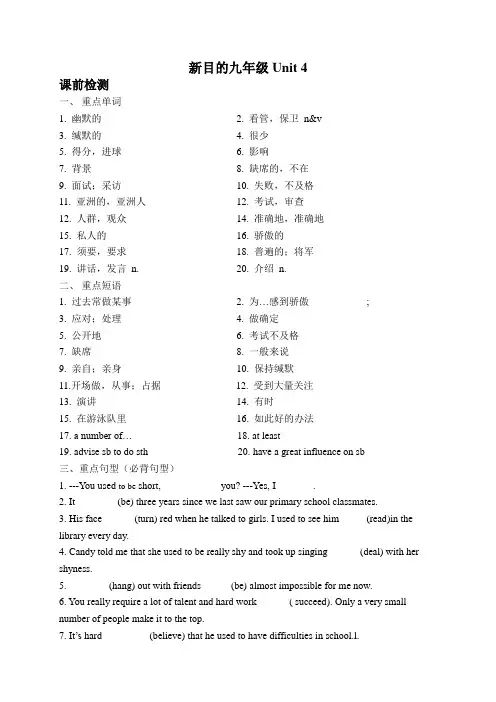
新目的九年级Unit 4课前检测一、重点单词1. 幽默的___________2. 看管,保卫n&v___________3. 缄默的___________4. 很少___________5. 得分,进球___________6. 影响___________7. 背景___________ 8. 缺席的,不在___________9. 面试;采访___________ 10. 失败,不及格___________11. 亚洲的,亚洲人___________ 12. 考试,审查___________12. 人群,观众___________ 14. 准确地,准确地___________15. 私人的___________ 16. 骄傲的___________17. 须要,要求___________ 18. 普遍的;将军___________19. 讲话,发言n. ___________ 20. 介绍n. ___________二、重点短语1. 过去常做某事___________2. 为…感到骄傲___________ ; ___________3. 应对;处理___________4. 做确定___________5. 公开地___________6. 考试不及格___________7. 缺席___________ 8. 一般来说_________9. 亲自;亲身___________ 10. 保持缄默_________11.开场做,从事;占据___________ 12. 受到大量关注___________13. 演讲___________ 14. 有时___________15. 在游泳队里______________ 16. 如此好的办法_________________17. a number of…______________ 18. at least_____________19. advise sb to do sth_____________ 20. have a great influence on sb______________三、重点句型(必背句型)1. ---You used to be short, ___________ you? ---Yes, I _______.2. It ________(be) three years since we last saw our primary school classmates.3. His face ______(turn) red when he talked to girls. I used to see him _____(read)in the library every day.4. Candy told me that she used to be really shy and took up singing ______(deal) with her shyness.5. ________(hang) out with friends _____ (be) almost impossible for me now.6. You really require a lot of talent and hard work ______( succeed). Only a very small number of people make it to the top.7. It’s hard _________(believe) that he used to have difficulties in school.l.8. Sometimes he was absent from classes and_______( fail) his examinations.9. She advised them _______( talk) with their son in person.10. My life__________(change) a lot in the last few years.四、重点语篇From Shy Girl to Pop StarThe Young World magazine i________ 19-year-old pop star Candy Wang, who used to be shy and t_____ up singing to deal with her s____. Now she d_____ to sing in front of thew______ school and crowds. And she gets t____ of attention everywhere she goes. However, she has to be very c________ about w___ I say or do. And she doesn’t have much p________ time anymore. _______(hang) out with friends is almost i_________ because of the guards. Also, being a singer is difficult and people have to be prepared_________(give) up their normal life. It r_______ a lot of talent and hard work. Only a very small number of people m_____ it to the top.He Studies Harder Than He Used toLi Wen, a 15-year-old boy from the countryside, works very hard and d_____ well in school. It is hard _______(believe) that he used to have difficulties. When his parents moved to the city to work, he missed them so much that he often felt l_____ and unhappy, which greatly i_______ his schoolwork. He was sometimes a_____ from classes. Then his parents made the d_________ to send him to a boarding school. Finding the life there d________, Li Wen wanted to leave the school. His teacher a_______ his parents to talk with their son in p____, It was e______ what he needed. He realized that his parents would always love him and take p_____ in everything that he did. Now he is m____ happier than he used to be.考点学问梳理1. used to do sth.; be used to doing sth;be used to do sthused to do sth意为“过去经常做某事”. used to的疑问句形式是“Did…use to do?”或“Used…to do”; used to 的反意疑问句也用助动词did(n’t)或used(n’t)构成。
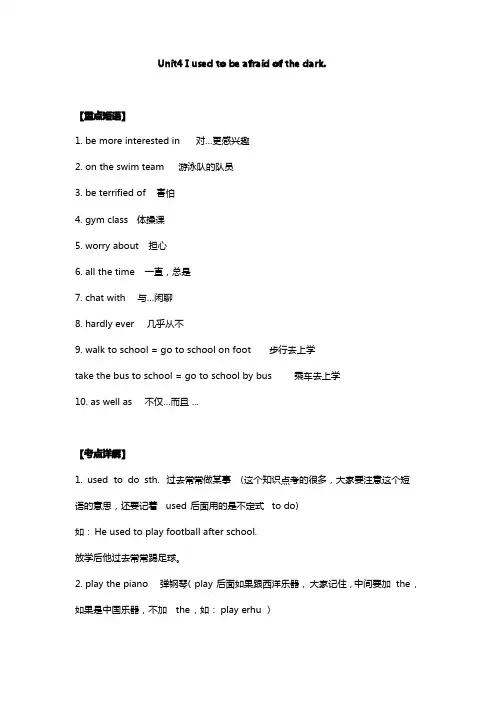
Unit4 I used to be afraid of the dark.【重点短语】1. be more interested in对…更感兴趣2. on the swim team游泳队的队员3. be terrified of害怕4. gym class体操课5. worry about担心6. all the time一直,总是7. chat with与…闲聊8. hardly ever几乎从不9. walk to school = go to school on foot步行去上学take the bus to school = go to school by bus乘车去上学10. as well as不仅…而且...【考点详解】ed to do sth.过去常常做某事(这个知识点考的很多,大家要注意这个短语的意思,还要记着used后面用的是不定式to do)如:He used to play football after school.放学后他过去常常踢足球。
2. play the piano弹钢琴(play后面如果跟西洋乐器,大家记住,中间要加the,如果是中国乐器,不加the,如:play erhu)3.①be interested in sth.对…感兴趣②be interested in doing sth.对做…感兴趣(对于这两个用法大家一定要掌握,切记切记)如:He is interested in math, but he isn't interested in speaking English.他对数学感兴趣,但是他对说英语不感兴趣。
4. interested adj.感兴趣的,指人对某事物感兴趣,往往主语是人interesting adj.有趣的,指某事物/某人具有趣味,主语往往是物(对于interested 和interesting要区分清楚,一个主语往往是人,一个主语往往是物)5. be terrified of sth.害怕……如:I am terrified of the dog.be terrified of doing sth.害怕做……如:I am terrified of speaking.6. spend动词,表示“花费金钱、时间”(spend和pay for它们的主语都是人,这一点大家要清楚)①spend…on sth.在某事上花费(金钱、时间)(重要考点)②spend…(in)doing sth.花费(金钱、时间)去做某事(重要考点,尤其要注意动名词,也就是动词的ing形式)如:He spends too much time on clothes.他花费太多的时间在衣着上。
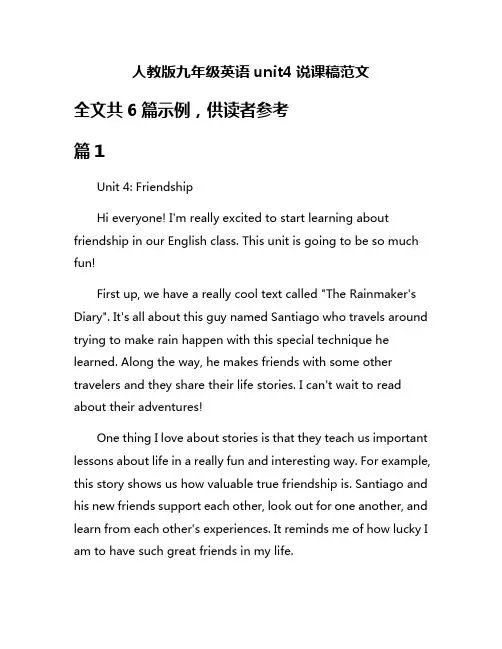
人教版九年级英语unit4说课稿范文全文共6篇示例,供读者参考篇1Unit 4: FriendshipHi everyone! I'm really excited to start learning about friendship in our English class. This unit is going to be so much fun!First up, we have a really cool text called "The Rainmaker's Diary". It's all about this guy named Santiago who travels around trying to make rain happen with this special technique he learned. Along the way, he makes friends with some other travelers and they share their life stories. I can't wait to read about their adventures!One thing I love about stories is that they teach us important lessons about life in a really fun and interesting way. For example, this story shows us how valuable true friendship is. Santiago and his new friends support each other, look out for one another, and learn from each other's experiences. It reminds me of how lucky I am to have such great friends in my life.Speaking of friends篇2Unit 4 - FriendshipHi friends! Today we're going to talk about a really important topic - friendship. This unit is all about making friends, being a good friend, and why friends are so valuable.First, let's think about how we make new friends. Sometimes it can be kind of scary to approach someone you don't know very well. But making an effort to be friendly, ask questions about the other person, and find common interests can really help break the ice. It's important to be yourself too - you want to make real friends who like you for who you are.In the reading "An Intro to Making Friends", it talks about ways to start conversations. Some good tips are to smile, make eye contact, and ask open-ended questions that can't just be answered with "yes" or "no". For example, instead of asking "Do you like video games?", you could say "What's your favorite video game?" That encourages the other person to share more.The difficult part is keeping the conversation going if there are awkward silences. But don't worry, the passage givesstrategies like asking follow-up questions or making simple observations about your surroundings. Just try to be relaxed and keep the focus on learning about the other person.Speaking of focusing on others, that's really important for being a good friend too. In the dialogue between Amy and her mom, Amy was worried because her friend Jane seemed down lately. Her mom reminded her that a key part of friendship is being there to listen without judgement when a friend is struggling.Jane was going through a hard time with her parents fighting a lot at home. It made me feel really lucky that my parents get along well, but also sad imagining how stressful that must be for Jane. I'm glad she had Amy to confide in as a supportive friend.The example shows how friends need to be caring, loyal and keep things shared in confidence. A true friend doesn't gossip about someone else's personal business or family issues. Trust and dependability are the foundation of any close friendship.At the same time, having friends who are a positive influence is really valuable during our school years. In the narrative about Mark and his friend group, Mark realized some of the guys were engaging in risky behavior by skipping class and defyingteachers. Even though they were his buddies, Mark decided to spend less time with that crowd.Finding friends who share your values, interests, and goals is ideal. True friends will motivate you to be your best self, not pressure you into making poor choices that could mess up your future plans. This can be a hard lesson to learn when you're a teenager and really want to fit in, but having principles you stick to will pay off.That reminds me of the saying, "You can't be friends with everyone." There will always be some people you just don't click with, and that's okay. As long as you treat others with basic kindness and respect, you don't have to be super close pals with a person.What really matters is nurturing a few quality friendships with people you really connect with and share a bond. Make the effort to keep plans together, celebrate their successes, and be there during tough times. Plan little surprise treats like baking their favorite snacks. Write silly notes to brighten their day.Most importantly, be a good listener and give your full attention when a friend needs to vent or seeks advice. Don't judge, but also don't be afraid to gently voice concern if they seem to be making unhealthy choices that could harmthemselves or others. Having friends you can truly rely on is such a blessing.Well, that's my key takeaway about the importance of friendship - having a few great friends can get you through almost anything life throws your way. True friends lift you up, believe in you, and will be by your side through thick and thin. I feel so lucky to have such wonderful friends and hope we all can keep being great friends to each other too.篇3Unit 4 - Telling StoriesHi everyone! This is my lesson plan for Unit 4 of our 9th grade English book. This unit is all about telling stories. Stories are so much fun!The unit starts with a really cool story called "The Miller's Bagpipes." It's about a miller who was very poor but loved playing his bagpipes. One day, some rich people heard him playing and thought it sounded amazing. They invited him to play for the king! The miller was very nervous but he played his best. The king loved it and gave the miller a big bag of gold! The story shows that if you follow your passion, good things can happen.After that story, there are some reading passages about different storytelling traditions around the world, like Aboriginal dreamtime stories from Australia. I think stories from different cultures are really interesting to learn about.Next, the book teaches grammar for reported speech. That's when you repeat what someone else said, like "He said he was tired." It also has exercises for using direct and indirect quotes correctly when retelling stories.Then there is a whole section on descriptive writing and using vivid details to make stories more interesting. We learn techniques like using the five senses, metaphors, and imagery. The example paragraphs paint such clear pictures in my mind!The pronunciation practice has us working on intonation when telling stories aloud. We learn to use our voices to create suspense, convey emotions, and keep the listener engaged. This is really useful for making our storytelling more dramatic and entertaining.My favorite part is the project at the end where we get to write and illustrate our own short story books! I'm so excited to be creative and share my imagination. We can make the books by hand or use computers.Overall, this unit will help us become better storytellers and writers. I'm looking forward to reading the example stories, practicing the new skills, and hopefully creating an awesome short story that people will really enjoy!Let me know if you have any other questions! I tried to cover all the key parts of Unit 4 but let me know if you need me to explain anything in more detail.篇4Unit 4: A Brighter FutureHi everyone! Today we're going to learn about Unit 4 in our English textbook. It's all about how science and technology can help make the world a better place. Get ready to learn some super cool stuff!The unit starts off with a reading passage called "Alternative Energy Sources". It talks about different types of renewable energy like solar, wind, and hydroelectric power. These are important because they don't pollute the air or cause global warming like burning fossil fuels does. The passage explains how each kind of renewable energy works in a really simple way. After reading it, I learned that solar panels absorb sunlight and turn it into electricity. Wind turbines use the wind to spin and generatepower. And hydroelectric dams use the force of moving water to drive turbines. So awesome!There are also lots of new vocabulary words related to energy and the environment like "sustainable", "emission", and "depletion". I had to look some of them up at first, but now I can use them when discussing climate change and green technology. My favorite new phrase is "carbon footprint" which means the amount of greenhouse gases produced by a person's activities. I'm going to try hard to reduce my carbon footprint!The next section is a interesting dialogue between two students talking about what they learned from a science exhibition on new energy inventions. One of the displays they discuss is a super efficient cooking stove that uses very little fuel and produces hardly any smoke. In poor countries, a stove like that could really help improve people's health and protect forests from being chopped down for firewood. The other invention is a cheap, DIY windmill made from recycled plastic bottles and bamboo that can generate electricity for a few light bulbs or charge mobile phones. I would love to make one of those myself!After the dialogue, there are some challenging reading comprehension activities to test how well we understood themain ideas. The questions ask us to identify details, make inferences, and give our own opinions. I got stuck on a few, but working together with my classmates helped me figure out the right answers.My favorite part of the unit is the project at the end where we had to research and design our own creative solutions for energy or environmental problems. I decided to look at ways to reduce plastic waste by reusing and recycling more. My idea is to collect plastic bottles, crush them into flakes, and then melt them down to be remolded into new products. I made a whole presentation about the step-by-step process with some drawings and even a little model I built. It was really fun to work on but also educational because I learned about things like polymers, compacting, and injection molding machines.When I gave my presentation to the class, some of my friends had great suggestions too like turning the crushed plastic into construction bricks or roof tiles instead of consumer products. Or setting up a plastic bottle collection program in our community to gather the raw material. Hearing their creative ideas gave me even more appreciation for how science and innovative thinking can lead to practical ways of protecting the planet.Overall, Unit 4 has definitely been one of my favorites so far. The topics of energy and environmental sustainability might sound kind of boring at first, but the readings and activities brought them alive in an engaging, interactive way. I realized how important it is for my generation to prioritize developing clean, renewable power sources and sustainable habits. With the knowledge I've gained, I feel empowered to do my small part in creating a brighter, greener future for everyone. Science is so awesome!篇5Unit 4 Lesson PlanHi everyone! Today we're going to learn about Unit 4 in our 9th grade English book. It's all about customs and festivals from around the world. I think this unit is super interesting because we get to explore different cultures and traditions. Buckle up, it's going to be a fun ride!The unit kicks off with Section A called "Festivals Across Cultures". The first text is a news report about the Mardi Gras festival in New Orleans. I had never heard of Mardi Gras before, but it sounds like a wild party! People dress up in crazy costumes and have huge parades with colorful floats. The streets arepacked with dancers, musicians and revelers. It's a celebration before the fasting period of Lent begins for Catholics. How cool is that?After the news report, there are some fun vocabulary words to learn like "revelry", "masquerade" and "procession". The exercises look at defining vocabulary from context clues. Then we move on to some reading comprehension questions about the key details of the festival. This helps reinforce our understanding of the text.The next part discusses the origins and history of Mardi Gras. It dates all the way back to ancient pagan festivals in Rome and Greece! The Christians kept some of those customs when they arrived in the area centuries later. So Mardi Gras combines different cultural traditions into one big bash. Mind-blowing, right?Up next is a short play script about two English guys experiencing Mardi Gras for the first time. They seem totally confused by all the craziness going on around them. Their dialogue is hilarious! We'll get to practice reading conversational English by acting out the script. Maybe we can even put on a mini performance for the class.Section B is called "A Diversity of Cultures". Here we learn about some other fascinating festivals worldwide. First up is Diwali, the Hindu festival of lights celebrated in India. During Diwali, houses are decorated with oil lamps and rangoli artworks made from colored powders. Families feast together and give gifts and sweets. It sounds like such a bright, joyous occasion!Next is the Cherry Blossom Festival in Japan, where people have picnics and parties under the blooming cherry trees. There are traditional dances, food stalls and even cherryblossom-flavored treats. The photos make it look like a scene from a painting. So pretty!After that, we read about Sinulog, an exciting festival in the Philippines. There's a massive street party with colorful costumes and masks representing the Santo Niño (Ho ly Child Jesus). People dance in the streets to the rhythm of drums. It's meant to honor the Catholic faith blending with the indigenous culture. The energy looks amazing!Towards the end of Section B, there are some activitiescomparing and contrasting the different festivals we learned about. We have to analyze their purposes, traditions and cultural significance. This helps solidify our understanding of the diversity explored in this unit.Finally, Section C is the "Learning by Nature" portion with a fun eco-friendly project. We get to research anenvironment-themed festival from another country and create a poster or brochure about it. That will let our creativity shine while teaching us research skills too. I'm so excited to learn about "green" festivals!Throughout the entire unit, there are lots of opportunities to practice our English skills. We'll read different text types, learn new vocabulary, work on grammar points, and discuss cultural similarities and differences. Studying world festivals is such an engaging way to appreciate cultural diversity.By the end, I'm sure we'll all have a newfound appreciation for the rich tapestry of customs and traditions around the globe. Celebrations bring people together through shared experiences, even across different backgrounds. That's a value I hope we can all take away from this fantastic unit.Well, that's the rundown of Unit 4 folks! We've got readings, activities, projects and more headed our way. Bring your curiosity and open mind, and prepare to be dazzled by the vibrant world of international festivals. Let's have fun while we learn!篇6Unit 4 - Sharing This PlanetHey there, friends! It's me again, ready to take you on another fun-filled adventure through our English textbook. This time, we're diving into Unit 4, which is all about sharing this incredible planet we call home. Get ready for some fascinating stories, thought-provoking discussions, and maybe even a few surprises along the way!First up, we have the reading passage "The Whale Rider." Now, I know what you're thinking – "Whales can ride? That's crazy!" Well, hold on to your seats because this story is about something even more amazing. It's a tale of a young Maori girl named Kahu, who dreams of becoming the chief of her tribe, even though tradition dictates that only males can hold that position. Talk about girl power!As we read through this engaging narrative, we'll discover the struggles Kahu faces and the incredible courage she displays in pursuing her dreams. We'll also learn about the rich cultural traditions of the Maori people and the importance of respecting nature and our environment. Who knows, this story might even inspire some of us to become whale riders ourselves (just kidding, of course)!Moving on, we have the fantastic unit "A Green Community." Raise your hand if you love our planet Earth! (I'm pretty sure all hands are up right now.) In this section, we'll explore various ways to make our communities more eco-friendly and sustainable. From reducing waste to conserving energy, we'll discover practical tips and strategies that we can implement in our daily lives.One of the highlights of this unit is the listening task, where we'll hear from a group of students who have taken it upon themselves to create a greener school environment. Their enthusiasm and dedication are truly inspiring, and it just goes to show that even the smallest actions can make a big difference in protecting our planet.But wait, there's more! We'll also delve into the wonderful world of poetry with the piece "The Dragon City." Now, I know poetry can sometimes seem a bit intimidating, but trust me, this one is a real treat. It's a beautifully crafted work that explores the theme of environmental pollution and its impact on our cities. As we analyze the vivid imagery and powerful language, we'll gain a deeper appreciation for the artistic expression of important issues.Last but not least, we'll have the opportunity to showcase our creativity and communication skills through various writing and speaking tasks. From crafting persuasive essays on environmental issues to participating in lively debates and discussions, this unit offers plenty of chances for us to express our thoughts and opinions on the crucial topic of sharing our planet.So, there you have it, friends – a sneak peek into the exciting world of Unit 4. Get ready to be inspired, challenged, and maybe even a little bit surprised as we embark on this journey together. Who knows, by the end of it all, we might just become the next generation of eco-warriors, ready to take on the world and make it a better place for everyone (and every whale)!。
Unit 4 What Would you Do?一、重点短语1.won the lottery 赢得抽奖2. in public 公共的、公众的3.plenty of 很多的、足够的4.let …down使…失望、沮丧5.medical research 医学研究6.what if 如果…怎么办7.get nervous (变得)紧张的8.be late for 迟到…上学迟到____________________________ 上班迟到_____________________________9.ask one’s permission 征求某人的许可without permission 未经许可10.introduce oneself 自我介绍self-introduction n.自我介绍11. rather than“而不是”would rather do sth. than do wth. “与其……倒不如”,“宁愿…...而不愿”12.a circle of good friends 朋友圈子13.关于“受伤”的单词区分:①injury n. 伤害,伤处一般指事故损伤或骨折等。
injure v. 伤害,损伤指事故中肉体上受到伤害,也指精神上的损伤,常用人作主语②wound v.&n. 一般指在战争或殴斗中用武器造成的伤害,常有明显的伤口③hurt vi.“疼痛” vt. 只用于表示人,特指伴有痛感的肉体伤害,也包括情感伤害④damage v.&n. 只用于物,常指机体功能的损害对于价值,效用,外观等所加物质上的损失,常由人的过失或者自然现象引起。
翻译:55名乘客在这次事故中受伤。
____________________________________________________________ 翻译:我的右脚疼。
_________________________________________________翻译:10名战士死亡,60名受伤。
Revision平山县外国语中学制作英语中的语气分为三类:1.陈述语气(用于陈述句、疑问句、感叹句)2.祈使语气(用于祈使句)3. 虚拟语气(用于条件状语从句、宾语从句等)二、虚拟语气如果所说的不是事实,而是一种假设、愿望、建议或是一种实现不了的空想,就用虚拟语气。
三、虚拟语气在非真实条件状语从句中的用法1、真实条件状语从句与非真实条件状语从句e.g. 如果他不快点,他就错过汽车了。
If he doesn’t hurry up, he will miss the bus.( 真实条件状语)2.如果我是你,我就立即走。
If I were you, I would go at once.(非真实条件状语从句)3.如果没有空气,人们将会死。
If there were no air, people would die.(非真实条件状语从句)2、虚拟语气在非真实条件状语从句中的用法及动词形式①表示与现在事实相反的情况(条件)从句谓语动词过去式形式(be用were)主句谓语动词形式should/would/could/might+动词原形eg:If I were you, I’d take an umbrella.如果我是你,我会带把伞。
(事实:我不可能是你)If his I telephone knew number, I tell would you. 如果我知道他的电话号码,我就会告诉你。
(事实:不知道)1.If I knew his telephone number, I would tell you.2.If were no there air water or, there be no would living on things the earth.如果没有水和空气,地球上就不会有生物。
(事实:地球上既有空气也有水)2.If there were no air or water, there would be no living things on the earth.3.If had I money any with me, I could you lend some.如果我带钱了,我就会借给你些。
Unit 4 I used to be afraid of the dark Section A1. dark1)adj.黑暗的It’s dark before 6 in winter. 冬天在6点钟之前天就黑了2)adj. 深的(用于形容颜色)a dark blue skirt一件深蓝色的裙子3)un. A. (the dark)黑暗I used to be afraid of the dark.我过去怕黑。
B. (前无the)天黑,晚上We must get there before dark.我们必须在天黑之前到达那儿。
2. used to do sth. 过去常常做某事(否定结构:usedn’t to do sth. / didn’t use to do sth. 一般疑问句结构:Did sb use to do sth.? / used sb to do sth?)be/get/become used to + n. / pron. / /doing sth.习惯于(做)某事be used to do sth. 被用来做某事(被动语态)be used for doing sth. 被用来做某事be used as 被作为……使用be used by sb. 被某人使用1) 他过去常常放学后踢足球。
He _________________after school.2) 他过去常常踢足球吗?3)他过去不吸烟。
4)我过去不是很文静。
5)他习惯于早起床。
6)木材被用来造纸。
Wood7)小刀是用来切东西的。
3. Don’t you remember me? 你不记得我了吗?(否定疑问句.根据事实回答)Yes, I do. 不, 我记得. No, I don’t 是的, 我不记得了4. wait a minute 等一等5. be more interested in 对…更感兴趣.6. be on the swim team = be a member of the swim team 在游泳队效力(是游泳队队员)7. sure1) adj.“确信的,确实的,一定……的”①be sure of sth确信某事②be sure+that从句:确信……③be sure to do sth必定会做某事2) adv ①无疑,确实②好,当然,没问题(用于应答)A.他深信自己会成功。
U 4、U1作文题目及优秀作文Unit 4题目一:书本P22 3b题目二:请以“I have changed a lot!〞为题,从外貌、性格、爱好或其他方面谈谈你这几年的变化,以及你认为自己最大的变化是什么要求:要点齐全,语义连贯,结构完整。
1. 敏捷运用本单元所学短语used to ;2. Write about how you have changed. What did you use to be like?(appearance, personality, hobbies) Which change is the most important one and why?I have changed a lot!As we all know, there will be various changes happening to us on the road to grow up. They may bee parts of our experience. In my opinion, no matter the changes are good or not, they’ll all help us to bee better if we accept them in a right way.How time flies! I have left my primary school for 3 years. When I started my middle school, it is time for a new beginning. During the past 2 years, I have changed a lot. In my memory, I used to be short, shy and serious. However, now I bee outgoing. So it is easy for me to make lots of friends in school. What is more, I bee so active that I join a lot of school activities. And I get tons of attention. But what makes me sad is that I have trouble in my study now. My poor grades make me feel upset all the time. Thanks to my dear classmates, they are glad to give hands to me. I think I will catch up with them!Besides the changes above, I think the most important change in my life is that I have taken up playing the guitar to deal with my study pressure. My parents advised me to develop an interest that can make me relaxed from school burden, At thesame time, I can enjoy a skilllearning process.Every coin has two sides. Whatever good changes or bad changes you will e across in life, please be calm and patient to face them. Because you’ll never know how it will make your life experience more colorful and meaningful.我转变了许多!我们都知道,在我们成长的道路上会发生各种各样的变化。
Unit 4 I used to be afraid of the dark.1.重点词汇score, background, guard, speech, public, ant, examination, pride, introduction, interview, dare, require, influence, fail, humorous...2. 短语归纳:ed to do 过去常常做2.deal with 对付;应付3.be proud of 为……骄傲,感到自豪4.take pride in 为……感到自豪5.from time to time 时常,有时6.in public 公开地7.in person 亲身,亲自8.take up sth 开始做,接受,占用9.not…anymore 不再10.worry about 为……担忧11.hang out 闲逛12.think about 考虑13.be alone 独处14.on the soccer team 在足球队15.no longer 不再16.make a decision 做决定17.to one’s surprise 令某人吃惊的是18.even though 尽管19.pay attention to 对……注意,留心20.in the last few years 在过去的几年里3. 必背典句:1. I used to be short. 我过去很矮。
2. I didn’t use to be popular in school. 我过去在学校不受欢迎。
3. -You used to be short, didn’t you? 你过去很矮,是吗?-Yes, I did./No, I didn’t. 是的,我是;不,我不是。
4. -Did he use to wear glasses? 他以前戴眼镜吗?-Yes, he did./ No, he didn’t. 是的,他是;不,他不是。
Unit4 I used to be afraid of the dark【必背短语】1. be more interested in 对…更感兴趣.2. on the swim team 游泳队的队员.3. be terrified of 害怕.4. gym class 体操课.5. worry about 担心.6. all the time 一直, 总是7. chat with 与…闲聊8. hardly ever 几乎从不9. walk to school =go to school on foot 步行去上学take the bus to school =go to school by bus 乘车去上学10. as well as 不仅…而且【细节知识点】1. used to do sth. 过去常常做某事be used to doing sth 习惯做某事be used to do sth 被使用去做某事如:He used to play football after school. 放学后他过去常常踢足球。
2.反意疑问句(原则,前肯定后否定,前否定后肯定)①肯定陈述句+否定提问如:Lily is a student, isn't she?②否定陈述句+肯定提问如:She doesn't come from China, does she?③提问部分用代词而不用名词如:Lily is a student, isn't she?④陈述句中含有否定意义的词如:little, few, never, nothing, hardly等,其反意疑问句用肯定式(对于第四点大家不要忽视,尤其是列举的这几个词,出题的时候经常遇到,对于下面的两个例子大家要仔细看一下,要把这个知识点彻底搞懂)。
He knows little English, does he? 他一点也不懂英语,不是吗?They hardly understood it, did they? 他们几乎不明白,不是吗?3.①be interested in sth. 对…感兴趣②be interested in doing sth. 对做…感兴趣(对于这两个用法大家一定要掌握,切记切记)如:He is interested in math, but he isn't interested in speaking English.interested adj. 感兴趣的,指人对某事物感兴趣,往往主语是人interesting adj.有趣的,指某事物/某人具有趣味,主语往往是物类似的这种形容词还有很多,比如excited exciting 等,ed结尾的一般主语指人,ing结尾的一般主语是物4. be terrified of sth. 害怕……如:I am terrified of the dog.be terrified of doing sth. 害怕做……如:I am terrified of speaking.5. walk to somewhere :步行到某处6. spend 动词,表示“花费金钱、时间”(spend和pay for 它们的主语都是人,这一点大家要清楚)①spend…on sth. 在某事上花费(金钱、时间)(重要考点)②spend…doing sth. 花费(金钱、时间)去做某事(重要考点,尤其要注意动名词,也就是动词的ing形式,很容易出现在选择题中)He spend 3 months building the bridge. 他花费了三个月去建这座桥。
Unit 4 I used to be afraid of the dark? 短语、句型:1.for the first time 第一次2.What’s he like? = What does he look like?他长什么样?3.形容词/副词+enough to do sth.足够…可以做某事e.g. old enough to dress himself足够大可以自己穿衣服4.from time to time = at times = sometimes 有时5.all the time = always一直,总是6.[辨析]so和such,"那么”so+adj. +a /an+n.(单)---so beautiful a girl such+a /an+(adj.)+n.(单)---such a beautiful girl 7.take the bus to school = go to school by bus坐公交车去上学8.It has been +一段时间+since(后接时间点)自从…以来已经多长时间了9.get good scores/ grades 取得好成绩10.keep/ remain silent 保持沉默11.be helpful to sb./sth. 对…有帮助12.take up doing sth. 开始做某事13.deal with 应付;对付14.dare (to) do sth. 敢于做某事15.get tons of attention 受到极大关注16.in private 私下地in public 公开地17.in person 亲自;亲身18.be prepared to do sth. 准备好做某事19.require sb. to do sth. 要求某人做某事20. a number of 许多(谓语动词用复数)the number of …的数量(谓语动词用单数)21.give a speech 作演讲22.(seldom 不常,很少;hardly 几乎不;never从不等这些词视作否定词,用于反意疑问句时,附加问句应用肯定式。
)e.g. He seldom eats breakfast, does he?23.in the last /past few years在过去的几年里(用于现在完成时)24.have an influence on sb. 对某人有影响25.absent from 缺席,不在26.fail an exam 考试不及格27.advise sb. to do sth. 建议某人做某事advise doing sth. 建议做某事(注:advice为不可数名词)28.“数字+连字符+名词单数”构成复合形容词e.g. a 7-day holiday a 24-hour train29.in the end = at last = finally最后,终于30.even though = even if尽管,即使31.no more= no t… any more 不再32.take pride in = be proud of对…感到自豪33.cause problems惹麻烦34.fight on 坚持下去35.be there for sb. 支持某人;陪伴某人36.general introduction 总体介绍37.so+助动词/be/情态动词+主语(不同主语)该结构主要用来说明前面所说的情况也同样适用于后面的人或物,意思为“…也是如此”。
注:此句型只用于肯定句。
否定句:要用“neither/nor+助动词/be/情态动词+主语”表示“…也不是”e.g. —I like playing basketball. 我喜欢打篮球。
—So do I. (=I like playing basketball, too.)我也喜欢。
(第一句中的I与第二句中的I不是同一人)so+主语+ 助动词/be/情态动词该结构是对上文所说的情况加以肯定,表示:“的确如此”,“确实这样”。
e.g.—He likes playing basketball .—So he does. 确实是这样。
语法要点:ed to do sth.表示“过去常做某事”,只表示过去和现在对比,暗示现在不做了。
to为动词不定式,后接动词原形。
eg:He used to go to school at six o’clock.他过去常常六点去学校。
2. used to do sth.的否定形式:usedn’t to do sth.主语+ used not to do sth.didn’t use to do sth.eg; He used to watch TV all day.他过去常常整天看电视。
→He usedn’t to watch TV all day.=He didn’t used to watch TV all day.他过去不常常整天地看电视。
注意:usedn’t= used not3. used to do的一般疑问句形式及其答语:(1)Used+主语+to do...?回答:Yes,sb. used to./No,sb. usedn’t to.eg:Tom used to read books.→Used Tom to read books?Yes,he used to./No,he usedn’t to.(2) Did十主语+use to do...?回答:Yes,sb. did./No,sb. didn’teg:I used to do homework after school.→Did you use to do homework after school?Yes,I did. /No,I didn’t.ed to do的反意疑问句形式也有两种,类似于否定句形式。
eg:-They used to go to the concert on Sunday,usedn’t/didn’t they?一Yes,they used to./No,they usedn’t to.(一Yes,they did./No,they didn’t.)拓展:sb. get/be used to ( doing) sth.某人习惯于(干)某事;sth.be used to do sth.某物被用于做某事;be used for(doing) sth.被用于做某事;作文范例:How I’ve Changed!My life has changed a lot in the last few years. I used to be short and thin, but now I am taller and stronger. I had so much time in the past, but now I’m too busy. For example, I used to play every day after school. Now I just study all the time. I used to be afraid of tests, but now I don’t worry about them.The biggest change in my life was that I am not the shy girl anymore. I used to remain silent most of the time. But now I dare to speak in front of the whole class. This is the most important change because I study more active than before.练习:1. My brother used to play football after school. (改为一般疑问句并做否定回答)_______ your brother _____ _____ ____ football after school? No, he _____.2. His brother used to be a quiet boy.(改为否定句)His brother _______ _____ ______ ______ a quiet boy.3. There used to be an old hospital behind our school, _____ ______? 或 _____ ______? (反意疑问句)4. My dad required me (finish) my homework on time.5. He liked listening to music before, but now he doesn’t like it.(合并为一句)He ______ _____ _______ listening to music.6. He spent an hour in finishing reading the book.( 改为同义句)It ______ him an hour _____ _________reading the book.7. A number of students (be) planting trees on the hill.The number of students in our class (be) 40.8.They used to be on the soccer team. (改为否定句) They ________ ______ ______ be on the soccer team.9.They promised to take care of my dog. (改为同义句)They promised to ________ ________ my dog.10. He advised (leave) here early.11. She gets used to (have) breakfast.12. John never watches TV after school, (反意疑问句)13.Mary took up (learn) English at the age of 13.14. The little boy is brave enough (go) out alone at night.15. The mother takes pride in her son.(改为同义句)The mother her son.16. The wood was used to (make) fire.17. He used to be short. (改为一般疑问句并作肯定回答)18.Anna used to wear glasses. (改为否定句)或。